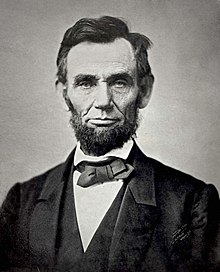America will never be destroyed from the outside. If we falter and lose our freedoms, it will be because we destroyed ourselves.
Abraham Lincoln
Abraham Lincoln was the 16th president of the United States, serving from March 1861 until his assassination in April 1865. Lincoln led the United States through its Civil War—its bloodiest war and its greatest moral, constitutional and political crisis. In doing so, he preserved the Union, abolished slavery, strengthened the federal government, and modernized the economy. With the “War of Northern Aggression” underway, his primary goal was to reunite the nation. He unilaterally suspended habeas corpus, arresting and temporarily detaining thousands holding secessionist or anti-war views in the border states without trial, ignoring the Ex parte Merryman ruling that such suspension is permitted only to Congress. Lincoln averted potential British intervention by defusing the Trent Affair in late 1861. His complex moves toward ending slavery centered on the Emancipation Proclamation in 1863, using the Army to protect escaped slaves, encouraging the border states to outlaw slavery, and helping push through Congress the Thirteenth Amendment to the United States Constitution, which permanently outlawed slavery. Lincoln closely supervised the war effort, especially the selection of top generals, including his most successful general Ulysses S. Grant. He made the major decisions on Union war strategy. Lincoln’s Navy set up a naval blockade that shut down the South’s normal trade, helped take control of Kentucky and Tennessee, and gained control of the Southern river system using gunboats. Lincoln tried repeatedly to capture the Confederate capital at Richmond; each time a general failed, Lincoln substituted another, until finally Grant succeeded in 1865.
An exceptionally astute politician deeply involved with power issues in each state, Lincoln reached out to “War Democrats” (who supported the North against the South), and managed his own re-election in the 1864 presidential election. As the leader of the moderate faction of the Republican party, Lincoln confronted Radical Republicans who demanded harsher treatment of the South, War Democrats who called for more compromise, antiwar Democrats called Copperheads who despised him, and irreconcilable secessionists who plotted his death. Politically, Lincoln fought back by pitting his opponents against each other, by appealing to the American people with his powers of oratory, and by carefully planned political patronage.
His Gettysburg Address of 1863 became an iconic statement of America’s dedication to the principles of nationalism, republicanism, equal rights, liberty, and democracy. Lincoln held a moderate view of Reconstruction, seeking to reunite the nation speedily through a policy of generous reconciliation in the face of lingering and bitter divisiveness. Six days after the surrender of Confederate commanding general Robert E. Lee, Lincoln was assassinated by John Wilkes Booth, a Confederate sympathizer.

